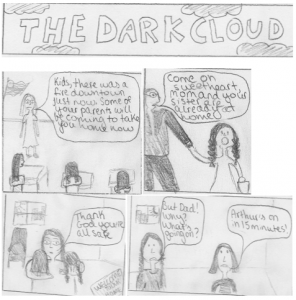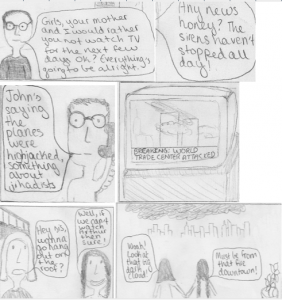September in New York, The Story of a Childhood
May 6th, 2014
This comic strip is inspired by Marjane Satrapi’s Persepolis, which we read for section last week. This week, we read another book, Mohsin Hamid’s The Reluctant Fundamentalist which deals with the effects of 9/11 on a young man’s life. In this response, I have drawn on both these books. I was actually living in New York in 2001, when the Twin Towers were attacked. I was in second grade at the time and had little idea of what was actually happening.
Like Satrapi’s memories of the Iranian Revolution, as recounted in Persepolis, my memories of 9/11 are still largely framed by my childish world view at the time. Of course, now, I understand what was going on. However, at the time, and to this day, the most vivid memories that stick with me are the little things that affected my daily routine as a second grader: being picked up from school early by my Dad (this was unusual as usually my mother came), not being allowed to watch TV with my sister, missing our favourite show Arthur and noticing the huge cloud of smoke when we went on our building’s roof terrace.
I found Satrapi’s use of the child’s gaze extremely effective when reading Persepolis. I do not believe that using personal memories as a way of framing historical events is a merely selfish exercise. Rather, I believe that a child’s unbiased perspective, like in the story The Emperor’s New Clothes sometimes reveals the greatest truth. In my case, I knew nothing. I had simply been told that there was a fire downtown. Yet, my sister and I could sense tension in the air. We knew that our parents, however well they had tried to disguise it, were also on edge. We knew that they did not know everything. I had the distinct suspicion that we were not being told the complete story.
My choice to depict 9/11 is two-fold. It is probably the single biggest historical event I have lived through, to date. It was also a day that would change the notion of “Islam” globally, forever. As Hamid so poignantly describes, after this event, life in the U.S. would never be the same for Muslims. With the fear and sense of violation that America felt came both heightened offense and defense. Within a few months was “the War on Terror,” in Afghanistan, and then the war in Iraq. Security at airports became the lengthy procedure it is today. Scrutiny of Muslims, men in particular became severe. I remembered hearing my Mum’s friend Waris, who has the unfortunate last name Hussein, complain that he was constantly interrogated in a separate room. I remember hearing how Bollywood’s biggest star Shahrukh Khan was also detained. Like a comic strip, these small snippets of news came to me, and, even as a child, I could tell things were changing.


Leave a Reply